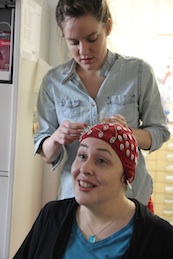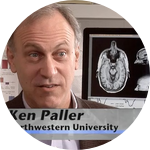About This Project
Our brains are very busy when we sleep. We need sleep not only to avoid being drowsy, but also to maintain our memories. Memories stored in the brain can be reactivated during sleep, and reactivating a memory can improve the ability to remember it later. Research in our lab focuses on how we remember and how sleep helps. Our new study will tell us whether false memories can be artificially implanted during sleep.Ask the Scientists
Join The DiscussionWhat is the context of this research?
We developed novel methods to study how memories are processed during sleep. Human volunteers come to our lab in Evanston for these experiments. Our results and those from other labs support the conclusion that memory storage can be changed during sleep.
In these experiments, we link some learning with specific sounds that play during the course of learning. Then, people go to sleep while we record their brain activity with EEG electrodes. When slow-wave sleep is reached, we play selected sounds at a very low level, thus avoiding arousal from sleep. These sounds are processed by the brain and can promote memory reactivation. We have observed the results of this memory reactivation using various memory tests. Memory performance is systematically altered by the sounds we play during sleep.
What is the significance of this project?
Although past experiments show that memories can be strengthened during sleep, scientists have yet to examine whether memory storage can be corrupted during sleep. In order to develop a better understanding of memory and sleep, we need to find out whether this type of distortion is possible. Plus, it would be amazing if a sort of inception (as in the movie by that name) can actually be accomplished. Our new experiment examines this possibility in a very direct way, using an established method for creating false memories.
If you have any questions for us, feel free to send email to kap@northwestern.edu and we will be pleased to reply.
What are the goals of the project?
We will use the requested funding to bring this experiment to completion.
(1) Our efforts will include data collection, with the cooperation of people who come to the lab for memory testing and for a nap in exchange for a small payment.
(2) We will conduct extensive data analysis.
(3) We will then attempt to make sense of the findings and publish an article, to the extent that clear conclusions are possible.
(4) As part of the process of advancing the scientific understanding of memory and sleep, we also plan to present our results at a scientific conference.
Budget
With your help, we will bring this experiment to fruition. Although we have a fully functioning laboratory for this kind of work, performing each experiment requires additional costs. A large part of our costs for sleep experiments are to pay people who help us by participating in the research. We also need to purchase a new electrode cap because these deteriorate with regular use. We must replenish standard supplies for EEG recording on a regular basis (e.g., conductive gel), and we need to pay fees to publish in scientific journals. To recruit participants, gain ethical approval within the university, keep computers working, and keep the lab running, we need the support of the lab coordinator (Susan). We have also included partial costs for presenting the results at a scientific conference.
Any funding received beyond the goal will go toward the costs of open-access publication, and then toward follow-up memory/sleep experiments.
We don't know yet whether inception is a reality or not.
But your help is really needed to make this project a reality!
Payments to Northwestern University are tax-deductible.
Meet the Team
Team Bio
Our lab group includes 4 PhD students, 2 postdocs, and many undergrad students. We focus on the neuroscience of human memory. We use behavioral methods of memory testing along with brain potentials and MRI. We study many types of memory in young adults, and memory impairment in neurological patients. In particular, we compare conscious memory abilities, as in the recall and recognition of facts and events, with unconscious memory abilities, such as skills and habits.Susan Florczak completed a senior honor's thesis in the lab and earned her bachelor's degree at Northwestern. She now works as the Lab Coordinator, and she contributed key ideas in designing the experiment.
Ken Paller went to college at UCLA, grad school at UCSD Neurosciences, and was a postdoc at Yale, University of Manchester (UK), and Berkeley.
All 3 co-investigators are featured in the NSF - Science Nation video (above, or link).
Iliana Vargas
I am a fifth year graduate student studying memory in Dr. Ken Paller’s Cognitive Neuroscience Lab at Northwestern University. I received a BS in Psychology from the University of Arizona.
Ken Paller
Cognitive Neuroscientist --
Northwestern University ----
Link to lab webpages
Additional Information


Publications from our lab can be viewed at our Lab Publications Webpage.
If you'd like to see the results of the inception study, visit the same webpage later -- our publication will eventually be featured.
Other information about our lab can be viewed at our Lab Website.
Questions? -- email us at kap@northwestern.edu
Credit for the Science Nation video (above) to Science Nation, National Science Foundation, http://www.nsf.gov/news/special_reports/science_nation/archive_2013.jsp http://www.nsf.gov/news/special_reports/science_nation/about.jsp
Project Backers
- 22Backers
- 38%Funded
- $1,670Total Donations
- $75.91Average Donation


